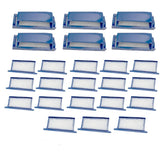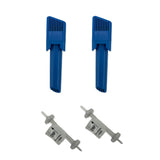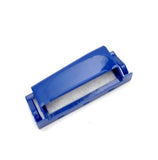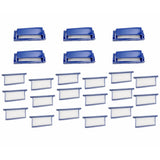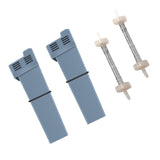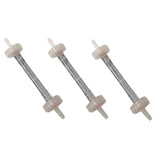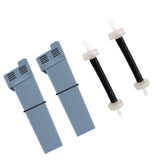Tech Tips
Tech Tips
Will Using Aftermarket CPAP Parts Void My Warranty?
Will Using Aftermarket CPAP Parts Void My Warranty?
Will Aftermarket Parts Void My Warranty?
On numerous occasions, the Federal Trade Commission (FTC), the agency has confirmed that the Magnuson-Moss Warranty Act (United States Federal Law (15 U.S.C. § 2301 et seq.):
Makes it illegal for companies to void your warranty or deny coverage under the warranty simply because you used an aftermarket part.
The FTC has stated that an aftermarket' part is a part made by a company other than the equipment manufacturer or the original equipment manufacturer.
The FTC has stated in an April 2018 statement that the:
FTC staff has concerns about the companies’ statements that consumers must use specified parts or service providers to keep their warranties intact. Unless warrantors provide the parts or services for free or receive a waiver from the FTC, such statements generally are prohibited by the Magnuson-Moss Warranty Act, a law that governs consumer product warranties. Similarly, such statements may be deceptive under the FTC Act.
The specific language in the Act is remedial and is intended to protect consumers from deceptive warranty practices by the original equipment manufacturer. Manufacturers are not required to have warranties, but if one is given, it MUST comply with the Magnuson-Moss Act.
The Act was created to prevent wide-spread consumer fraud and according to a report from the House of Representatives which accompanied the law (House Report No. 93-1197, 93d Cong 2d Sess.), the Magnuson-Moss Act was enacted by Congress in response to merchants' widespread misuse of express warranties and disclaimers.
“Under the Magnuson-Moss Warranty Act, the warranty cannot be conditioned to a specific brand of parts, services or vehicle modifications unless those parts or services are provided free of charge.”
Thomas B. Pahl, Acting Director of the FTC’s Bureau of Consumer Protection stated that “provisions that tie warranty coverage to the use of particular products or services harm both consumers who pay more for them as well as the small businesses who offer competing products and services.”
The FTC alert notes that a consumer, like yourself, has the right to purchase from independent retail stores, aftermarket sources, and repair shops for parts and service without fear of voiding the product warranty. The manufacturer has the right to deny a warranty repair but they must demonstrate that the aftermarket part caused the problem. The warranty remains in effect for all other covered parts.
Examples of possibly illegal warranty provisions:
Each company used different language, but here are examples of questionable provisions from the FTC:
- The use of [company name] parts is required to keep your . . . manufacturer’s warranties and any extended warranties intact.
- This warranty shall not apply if this product . . . is used with products not sold or licensed by [company name].
- This warranty does not apply if this product . . . has had the warranty seal on the [product] altered, defaced, or removed.
What can you do?
Finally, consumers may seek redress in the courts for alleged violations of the Magnuson–Moss Act. A consumer who has been injured by a supplier's noncompliance may bring an action in federal court if the amount in controversy is over $50,000 or a class action if the number of class plaintiffs is greater than 100.
If the jurisdictional amount, or the number of plaintiffs, does not meet these thresholds, an action under the act may be brought only in state court.
Moreover, one of the key aids to the effectiveness of the Act is that a prevailing plaintiff may recover reasonable costs of suit, including attorney fees.
For Individual Consumers
Complaints about fraud, scams, phishing, identity theft, unwanted telemarketing, credit or debt issues, or other unfair business practices may be submitted to https://www.ftccomplaintassistant.govFor Journalists
Office of Public AffairsTelephone: (202) 326-2180
Email: opa@ftc.gov
HSR Filings
For questions about how to file Premerger notification or for information about the HSR program, please see the Premerger Notification Office contact information.Administrative Litigations
For general information, or to submit a filing in an administrative litigation before an Administrative Law Judge or before the Commission, please contact secretary@ftc.gov.
For Organizations
Complaints about mergers, antitrust issues, acquisitions and business conduct that harm competition, limit products or services, destroy innovation, or raise prices may be submitted to antitrust@ftc.gov
Will Aftermarket Parts Void My Warranty?
On numerous occasions, the Federal Trade Commission (FTC), the agency has confirmed that the Magnuson-Moss Warranty Act (United States Federal Law (15 U.S.C. § 2301 et seq.):
Makes it illegal for companies to void your warranty or deny coverage under the warranty simply because you used an aftermarket part.
The FTC has stated that an aftermarket' part is a part made by a company other than the equipment manufacturer or the original equipment manufacturer.
The FTC has stated in an April 2018 statement that the:
FTC staff has concerns about the companies’ statements that consumers must use specified parts or service providers to keep their warranties intact. Unless warrantors provide the parts or services for free or receive a waiver from the FTC, such statements generally are prohibited by the Magnuson-Moss Warranty Act, a law that governs consumer product warranties. Similarly, such statements may be deceptive under the FTC Act.
The specific language in the Act is remedial and is intended to protect consumers from deceptive warranty practices by the original equipment manufacturer. Manufacturers are not required to have warranties, but if one is given, it MUST comply with the Magnuson-Moss Act.
The Act was created to prevent wide-spread consumer fraud and according to a report from the House of Representatives which accompanied the law (House Report No. 93-1197, 93d Cong 2d Sess.), the Magnuson-Moss Act was enacted by Congress in response to merchants' widespread misuse of express warranties and disclaimers.
“Under the Magnuson-Moss Warranty Act, the warranty cannot be conditioned to a specific brand of parts, services or vehicle modifications unless those parts or services are provided free of charge.”
Thomas B. Pahl, Acting Director of the FTC’s Bureau of Consumer Protection stated that “provisions that tie warranty coverage to the use of particular products or services harm both consumers who pay more for them as well as the small businesses who offer competing products and services.”
The FTC alert notes that a consumer, like yourself, has the right to purchase from independent retail stores, aftermarket sources, and repair shops for parts and service without fear of voiding the product warranty. The manufacturer has the right to deny a warranty repair but they must demonstrate that the aftermarket part caused the problem. The warranty remains in effect for all other covered parts.
Examples of possibly illegal warranty provisions:
Each company used different language, but here are examples of questionable provisions from the FTC:
- The use of [company name] parts is required to keep your . . . manufacturer’s warranties and any extended warranties intact.
- This warranty shall not apply if this product . . . is used with products not sold or licensed by [company name].
- This warranty does not apply if this product . . . has had the warranty seal on the [product] altered, defaced, or removed.
What can you do?
Finally, consumers may seek redress in the courts for alleged violations of the Magnuson–Moss Act. A consumer who has been injured by a supplier's noncompliance may bring an action in federal court if the amount in controversy is over $50,000 or a class action if the number of class plaintiffs is greater than 100.
If the jurisdictional amount, or the number of plaintiffs, does not meet these thresholds, an action under the act may be brought only in state court.
Moreover, one of the key aids to the effectiveness of the Act is that a prevailing plaintiff may recover reasonable costs of suit, including attorney fees.
For Individual Consumers
Complaints about fraud, scams, phishing, identity theft, unwanted telemarketing, credit or debt issues, or other unfair business practices may be submitted to https://www.ftccomplaintassistant.govFor Journalists
Office of Public AffairsTelephone: (202) 326-2180
Email: opa@ftc.gov
HSR Filings
For questions about how to file Premerger notification or for information about the HSR program, please see the Premerger Notification Office contact information.Administrative Litigations
For general information, or to submit a filing in an administrative litigation before an Administrative Law Judge or before the Commission, please contact secretary@ftc.gov.
For Organizations
Complaints about mergers, antitrust issues, acquisitions and business conduct that harm competition, limit products or services, destroy innovation, or raise prices may be submitted to antitrust@ftc.gov

